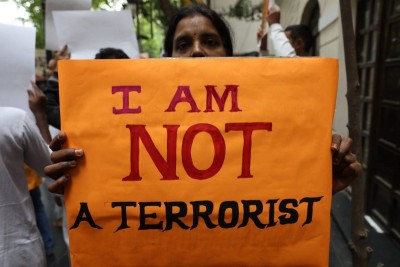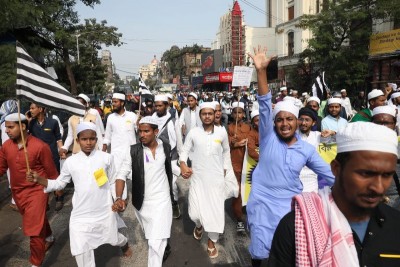 JammuandKashmir
JammuandKashmir
J&K performs well in NITI Aayog’s SDG Index
Srinagar/IBNS: Jammu and Kashmir have performed well in the NITI Aayog’s Sustainable Development Goal (SDG) India Index 2020-21, which was released by the National Institution for Transforming India recently.
The index is developed by NITI Aayog in collaboration with the United Nations. It was first launched in December 2018.
It ranks all states and union territories based on 115 indicators (16 goals and 70 targets) aligned with the National Indicator Framework (NIF) of the Ministry of Statistics and Programme Implementation. The indicators assess the performance in health, education, gender, economic growth, institutions, climate change and environment, etc.
Of the 15 goals applicable to J&K, it has been categorised as the front runner in respect of 8 goals, performer in 3 goals and achiever in respect of one goal.
As far as goal number 1 (No poverty), which has six indicators including the percentage of the population living below the national poverty line is concerned, J&K has scored 69 points. It has been categorized as “Front Runner”.
To measure India’s performance towards the ‘Goal of No Poverty’, six national level indicators have been identified, which capture four out of the seven SDG targets for 2030 outlined under this Goal.
These indicators have been selected based on the availability of data at the sub-national level and to ensure comparability across states and UTs.
In goal number 2 (Zero Hunger), which has seven indicators like percentage of beneficiaries covered under the National Food Security Act and percentage of children under five years who are underweight, J&K has secured 71 points and has been rated as Front Runner. The SDG aims to end all forms of hunger and malnutrition by 2030, making sure all people - especially children - have sufficient and nutritious food all year.
J&K has also secured 70 points and has been rated as Front Runner in goal number 3 (Good Health and Well-Being) under which there are nine indicators like Maternal Mortality Rate. Good health is essential to sustainable development and the 2030 Agenda reflects the complexity and interconnectedness of the two.
It takes into account widening economic and social inequalities, rapid urbanisation, threats to the climate and the environment, the continuing burden of HIV and other infectious diseases, and emerging challenges such as non-communicable diseases.
As far as Clean Water and Sanitation (Goal No 6) is concerned, J&K has secured 88 points and has been categorised as Front Runner. Goal 6 calls for access to safe and affordable drinking water, sanitation facilities, and hygiene for all by 2030.
Under this goal, the main indicators are the percentage of the rural population getting safe and adequate drinking water within the premises through pipe water supply and the percentage of individual household toilets constructed against the target.
The goal under which the J&K has been ranked as Achiever by getting 100 points pertains to affordable and clean energy and this indicates that all the households in J&K have been electrified.
Energy security is a prerequisite for socio-economic development. Access to energy enables people to augment their income and productivity, enhance access to healthcare, water and education, and improve their overall well-being. Goal 7 is aimed at ensuring universal access to affordable, reliable and efficient energy services by 2030.
As far as Goal number 8 (Decent Work and Economic Growth) is concerned, J&K has been declared as “Aspirant” by securing 47 points. Annual Growth Rate of GDP, Ease of Doing Business and Unemployment are among the key indicators under this SDG. Goal 8 promotes sustained economic growth, higher levels of productivity and technological innovation.
In goal number 10 (Reduced Inequalities), J&K and has secured 65 points and has been rated as Front Runner. The goal calls for progressively reducing not only income inequalities but also inequalities-of outcome by ensuring access to equal opportunities and promoting social, economic and political inclusion of all, irrespective of age, sex, disability, race, ethnicity, origin, religion or economic or any other status relevant within society.
About Goal number 12 (Responsible Consumption and Production), the NITI Aayog has placed the UT in the category of Front Runner for securing 95 points.
J&K has been categorised as Performer for securing 63 points, in the aspect which pertains to climate action. The UT has been rated as Performer under goal number 15, which pertains to quality of life on land.
The goal emphasises “doing more with less” thus promoting resource efficiency, green economies and sustainable infrastructure. It also focuses on reducing degradation and pollution and minimizing waste.
As far as the goal of peace, justice and strong institutions is concerned, J&K has secured 74 points and has been categorised as Front Runner.
The data reveals that there are 6.6 per cent cases under the Prevention of Corruption Act and related sections of the Indian Penal Code per 10 lakh population. The 2030 Agenda aims to significantly reduce all forms of violence, and work with governments and communities to end conflict and insecurity.
Support Our Journalism
We cannot do without you.. your contribution supports unbiased journalism
IBNS is not driven by any ism- not wokeism, not racism, not skewed secularism, not hyper right-wing or left liberal ideals, nor by any hardline religious beliefs or hyper nationalism. We want to serve you good old objective news, as they are. We do not judge or preach. We let people decide for themselves. We only try to present factual and well-sourced news.







